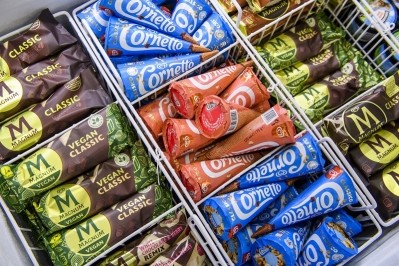Ice cream innovators offer sour outlook for vegan segment: ‘It doesn’t sell so well’

The vegan ice cream market is forecast to see strong growth. Research from Data Bridge, for instance, suggests the segment will grow by a CAGR of 10.8% through to 2029, when global sales are forecast to hit £850m. The consultancy says key drivers are an expanding cohort of consumers that identify as vegan, and ‘rising awareness’ of animal welfare issues, as well as perceived health benefits linked to a dairy free diet. “Europe is anticipated to deliver potential growth to the vegan ice cream market… owning to the changing consumer preferences towards healthy lifestyle along with the introduction of new flavours,” the report claims.
Certainly, we’ve seen a number of high-profile launches in the dairy-free ice cream space, with the likes of Unilever bringing out vegan alternatives for blockbuster brands including Ben & Jerry’s and Magnum. Oppo Brothers, a premium better-for-you ice cream challenger brand, has also done ‘a lot in the vegan space’, according to Co-Founder and MD Harry Thuillier. However, speaking during a panel organised ahead of trade show Food Ingredients Europe, the ice cream entrepreneur continued: “I have to say, that market is taking a lot longer to move than we were expecting.”
Why? One issue, Thuillier highlighted is quality. “It is hard to make a non-dairy ice cream taste as good as dairy,” he told the digital audience.
Another issue, according to Nick Luthman, Founder and Head of R&D at LUB Foods, is simply that consumers want dairy. “If you do consumer research, even vegans the one thing they cheat with is ice cream… It’s a big proportion of vegans that actually cheat with ice cream,” he claimed.
Like Thuillier, Luthman believes quality is an issue, noting it is challenging to find a plant-based base ingredient that performs as well as dairy and doesn’t come at a massively inflated cost. “We’ve tried every vegan ingredient [suppliers] send to us. All the [plant] proteins, they are always supposed to be flavourless, or neutral, or slightly nutty. We’ve never found any vegan thing we can make ice cream unless it is very expensive,” he noted.
Luthman chalked this problem up to the functional composition of dairy, which contains a mix of proteins that each deliver unique attributes for food ingredient applications. The major proteins present in milk include α-lactalbumin, β-lactoglobulin, immunoglobulin, bovine serum albumin, and the caseins: κ-casein, β-casein, and the α-caseins. “From a scientific perspective, they marry so well. If you isolate one they don’t perform as well."
Nevertheless, the R&D expert insisted, ‘I’m not giving up’. “When there are better alternatives that can be done with the same experience [as dairy] then we are ready to change,” he predicted.
In the search for ‘better alternatives’ LUB, which produces ice cream brand N!ck's, has worked with Perfect Day’s precision fermented whey ingredient to bring out an animal-free ice cream containing proteins that are bio-identical to dairy. “I got really interested in Perfect Day, who make precision fermented molecular whey proteins. I am a scientist; I was totally excited. Everybody has to understand how great this is. We can make the identical molecule in as more efficient way… I don’t know how much time I spent [developing] our animal free line with Perfect Day proteins. So much work. It’s on the market now, and I think its 1% of our revenue. I’m very disappointed in us putting so much work into it, launching it, and people want dairy.”
‘It’s hard to keep listings’
Both N!ck's and Oppo expressed disappointment at the sales velocities of the vegan and animal-free lines they have brought out. Summing up the challenges facing non-dairy ice cream, Thuillier simply noted: “It doesn’t sell so well.”
This, the food founder continued, presents an obstacle for smaller challenger bands who are battling for shelf space in a competitive retail environment. “It’s hard to keep the listings when you know you could get so many more sales with cookies and cream dairy,” he observed. “On vegan, I don’t think there is going to be a future for cows at some point, but it’s not going to be 10 years’ time. It might be 30 years’ time; it might be 40 years’ time. We’ve got to work with what we have and continue to drive quality non-dairy flavours.”
Retail is a sales-per-square-foot game. Any retail customer will require a minimum stock turnover for an SKU to maintain its spot-on shelf. And while industry pundits might talk about new flavour or texture trends driving consumer excitement, the retail reality means that successful flavour innovation actually tends to be pretty conservative, the ice cream experts noted.
“What people are asking for is the classics,” Luthman insisted. “You have to fight two wars. One is to have a great product, the other is to have people grab it from the shelf.”
When N!ck's brought out a chilli mango variant, which was endorsed by DJ Zedd, Luthman said consumers were cautious about the flavour pairing. “I think the only time you can really go a little bananas with is the seasonal flavours… that’s about as adventurous as it gets,” he stressed.
“You have to understand a retail stores have about 100-400 shelf spaces for ice cream. Every one of those have to rotate at a certain speed or you are out. So, you can’t have your blueberry lavender [flavour] there… More crunch , more peanut, more chocolate. That’s what people are buying. That’s why these Michelin chefs always take all the glory for a fantastic blueberry lavender, because people expect it.”
“Consumers generally in mass market grocery are not as exciting as we like to think they are,” agreed Wheyhey Founder Damien Kennedy. “Consumers aren’t that adventurous and as a challenger brand we can’t afford to spend a lot of money on a flavour that doesn’t move of the shelf.”
Nevertheless, Kennedy continued, Wheyhey does see innovation opportunities that have mainstream appeal: “There is some really cool innovation we are working on in terms of format. Hand held 3D printed figures etcetera, which again is creating adventure especially in the kids space.”
Healthy functional ingredients take back seat
Wheyhey, N!ck's and Oppo are all brands that operate in the better-for-you area of the ice cream segment. Wheyhey describes its products as ‘naturally low in sugar’ and ‘packed full of protein’; N!cks ice cream is ‘low fat, low calorie and keto friendly’; and Oppo claims to offer ‘60% less calories and sugar than regular ice cream’.
So, looking at innovation opportunities in ice cream, do all the founders believe that healthy and functional ingredients deliver consumer appeal? Only to an extent, it transpires.
“Ice cream is not a functional food it is first and foremost indulgence and enjoyment. If you are going for something that’s healthy, ice cream isn’t the first thing you are going to reach for. But in terms of what consumers are looking for, they don’t want to see too many things that they don’t recognise. They don’t want to see loads of sugar and calories if they are looking for something slightly better for you. In the past we put in lots of super foods – if you put that front of pack it can be confusing for consumers,” said Thuillier. In fact, he continued, Oppo uses baobab as an ingredient but doesn’t actually flag this to shoppers. “We do use it, but we don’t talk about it because it turns consumers off.”
Kennedy reported a similar experience in the early days of Wheyhey. “When we started the brand, we were doing sampling in Whole Foods talking about ‘this is high protein, sugar free, gluten free, vegetarian'… the consumer was like ‘what does that mean?’,” he reflected.
Wheyhey therefore decided to focus on three core messages: protein content, sugar content and ‘great’ taste. “Food is led by taste first and foremost. People will not compromise no matter how healthy.”




























